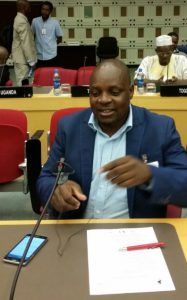Profile:
[lgc_column grid=”33″ tablet_grid=”33″ mobile_grid=”33″ last=”false”]

[/lgc_column]
COUNTRY OF ORIGIN: Zimbabwe
UNIVERSITY: Namibia University of Science and Technology (NUST)
STUDY COURSE: Spatial Science
DEGREE: PhD
RESEARCH TOPIC: A comparative analyses of agro-pastoral and wildlife-based land use in Zimbabwe’s semi-arid region
NUST – Center of Excellence in Southern Africa
The Department of Land and Property Sciences (DLPS) at NUST together with the Integrated Land Management Institute (ILMI) are at the forefront of research and outreach in the field of land governance and administration. Being known for strong research-policy linkages NUST provides a great opportunity to expand the knowledge and conduct a research for proactive students like Moyo.
Land-related challenges in Zimbabwe
Zimbabwe faces a number of challenges around land administration and development. Primarily, the country lacks a robust system and policies to sort and manage information. These long-term issues have contributed to poverty and inequality in Zimbabwe, and across Southern Africa.
I had 10 years of experience working for the government of Zimbabwe as a Land use Planner in the Ministry of Lands Agriculture and Rural Development before I enrolled for a Master programme majoring in land administration and management at the University of the Witwatersrand in South Africa. It’s thanks to the scholarship provided by NELGA that I was able to pursue a Doctor of Philosophy programme. My hope is that skills acquired and the research I contribute to can positively shape national and regional land governance policy. My motivation to undertake this research with the internationally recognized NUST university is to contribute to the literature on land reform and sustainable development. In the context of my PhD studies I’m currently analysing animal and crop farming in Beitbridge, Zimbabwe’s poorest district. I’m looking into land-use systems that help to redress poverty and inequality and improve food security. For example, with secure rights and access to land, rural farmers can grow crops, graze livestock, and increase household food production. Throughout Africa, democratic land governance systems are fundamental for both protecting human rights and creating a stable economic environment for investment, which in turn helps to alleviate poverty and improve food security. We must act now, and quickly to implement land reforms that help to protect our natural resource and provide a sustainable future for generations to come.